Chronic Pain
Chronic Pain is sometimes associated with difficulties such as Anxiety, Depression, Sleep problems, Loss of mobility and/or function.

Learn

What is Chronic Pain?
We all have a pain system that’s designed to protect us. Think of it like an alarm system that’s looking out for anything that might cause us harm or damage. Our pain system is made up of nerves that carry messages between the body and the brain. Not all pain is the same, however. Pain can be acute or chronic.

Thoughts and Pain
Psychologists who study pain have found that living with chronic pain can change the way you think about yourself and the world around you.

Pain Does Not Equal Damage
Pain is a normal part of life and doesn’t always mean that something is wrong. Think of pain as an alarm system inside you, looking out for any danger that might cause you harm. Sometimes this alarm system can react in a way that’s not proportionate to the danger it detects.

A Different Approach to Managing Pain
Chronic pain can affect people in different ways. Whatever the reason for your chronic pain, the approaches for managing the pain will be similar. This is because pain management is not about getting rid of your pain; it’s about helping you have a good quality of life despite the pain.

Coping with Changes
We all experience changes in our lives. Learn about how change can affect our wellbeing.
Self-Assess
How do you know if you have chronic pain?
Q: Have you experienced pain for more than twelve weeks?
Q: Has your pain persisted despite the use of medication or treatment?
If you answered ‘yes’ to these questions, you may recognise the experiences described below:
How your body might feel
- Aches and pains
- Stiffness in your joints
- Tense/ tight muscles
- Exhausted
- Sleeping too little or too much
- Tingling or numb like sensations
Thoughts you might have
- “I’m a burden”
- “I’m useless”
- “I’m a failure”
- “Things will never change”
- “I’m not coping”
- “I can’t go on like this”
Feelings you might have
- Sad
- Irritable
- Lonely
- Stressed
- No interest
- No pleasure
Things you might do
- Stop doing things you enjoy
- Spend more time alone
- Stay in bed a lot
- Push through the pain and end up feeling worse
- Take more medication
- Avoid others
If these look familiar, you might find it useful to learn more about chronic pain in the ‘Learn’ section above. You’ll also find some tips on managing chronic pain in the ‘Manage’ section below.
Manage

Managing Chronic Pain
When you’re living with chronic pain, managing your thoughts can be tricky. This page presents some techniques you may wish to try.

Pain Concern – Relaxation
This leaflet is designed to help you understand what stress is, inform you as to why is it important to be able to relax when you have chronic pain and provide some relaxation exercises for you to try.

Pain Concern – Manage Your Pain
A guide to becoming more active and reducing flare-ups. In this booklet Liz Macleod brings together a lifetime’s experience in helping people understand and manage their pain. Her practical approach gives encouragement to anyone who wants advice and support in living with pain.

Chronic Pain Self-Help Guide
This self-help guide is intended for people with mild-to-moderate mental health issues. It offers a number of techniques for helping you manage your pain, and improve your quality of life.

Tips on Managing Change in Our Lives
We all have to cope and manage with change in our lives for lots of reasons. Here are some tips and thoughts on navigating through a period of change.

Computerised Cognitive Behavioural Therapy
Cognitive Behavioural Therapy – CBT – is a psychological therapy based on the relationships between what we think, what we do and how we feel. CBT teaches you how to recognise and tackle problems in the here and now, rather than in the past.
Support
With support from the people in your life and with some help from the resources on this website, you may find that your pain becomes easier to manage over time.
However, if your ability to manage your pain doesn’t improve, or if you’re having difficulties with your mental health and need further support, please do get in touch with your GP in the first instance.
The following organisations may also be helpful:
- British Pain Society – Helpful information section for patients with pain conditions, and details of various support groups, including guidance supported by available evidence on clinical and other pain matters.
- Pain Concern – provides support for those with pain and their carers, and has factsheets and leaflets on different aspects of chronic pain and self-management.
- Brain Man – understanding pain in less than five minutes A video explaining chronic pain in less than five minutes.
- Pain Toolkit – a practical guide to self-management of chronic pain, with a detailed ‘toolkit’ which can be printed out. It is also available in French, German and Italian.
- Reconnect 2 life – An interactive program to help you look at pain and how it affects individuals. It consists of six modules which can be completed in any order













